For Your Eyes Only - Part One
Written by Paul McKay, HMS Brilliant 1982
Out with the old and in with the new, goes the saying. We often use the new year to reflect upon the past, whether it be the Good, the Bad or the Ugly. Last year, I crossed the Rubicon when I got rid of years of emotional numbing and finally found some inner peace and happiness. I thought of sharing the personal story for the first newsletter of the year. I hope you find it interesting. 38 years after trying to kill each other, an Englishman and a Cordovan have made peace. “This is the beginning of a long friendship,” Paul McKay told César Moreno. This is their story that confronted them on 15 May 1982 and that unites them today. I’ll let you into the secret that few people outside my family know. It is not that my life has been a magnificent indulgence or that I have a life as a secret agent; that said, I did appear as an extra in a James Bond movie. Spot the movie? A picture clue below.
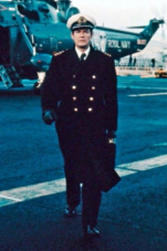
No, my secret is something more personal that many veterans does experience; that is the seeking of help for psychological scars long after leaving the service. Aged 37 and after years of internal torment, my naval career was at a crossroads and going nowhere. I was suffering from a myriad of physiological and psychological symptoms that were enough to have a significant impact on my day to day life in civvy street. I was posted from ship to shore for medical review. My marriage had failed. I was separated from family and friends, alcohol became a ‘false’ comfort. I came to spend as much time in the Guzz pubs and nightclubs as I was in and out of naval hospital. No one could help me. At that time my medical condition was not fully understood or explained. I was sliding down a slippery slope of depression. A naval psychiatrist reported that I was a high risk suicide case. I withdrew from friends and family, feeling angry, frustrated and even violent at times. Nowadays, thanks to the many veteran charities, the condition is recognized and there is help, even giving it a name of PTSD.
What also happened in 1991 did turn me around. After pleading to go back to sea, it was only a war in the Middle East that gave me my opportunity. I returned to front line duties, albeit with an P45 axe hanging over my head. I excelled in the changing environment and got back my mojo. It took this chapter in my life to realise that I was not a lost cause but suffering from a mental health condition caused by traumatic experience, something which the Navy didn’t fully recognise in those days. I started to see light at the end of a dark tunnel. In time, I turned the corner. My life was back on track. I also married for a second time to a great and understanding woman who has been by my side until today.
Yet today there remains the mental guilt of survival when other shipmates did not return home; there are images, sights and sounds left to haunt. In another article, I wrote about the trauma of ditching three times in a flying career, and the nightmares of being trapped underwater and drowning. Perhaps this was the start of traumatic events in my life leading to long term anxiety disorder, that I or no one else recognised. In those days, it was a case of dust yourself down and pull yourself together. Showing weakness was not being a man. Some people find it difficult to discuss trauma and are still searching for answers. I was in that category until many years after leaving the service.
This article relates to a search for something that happened in the Falkland War of 1982. I had never found the truth in any UK archive or official MOD account so I took to looking for answers in Argentina. The story is in two parts. It has not been told before. You are reading it for the first time. Part 1 is ascribed to friend and correspondent, Mariano Iannaccone who published the editorial below in the Spanish language Newspaper Via Cordoba, Argentina on 15 May 2020 ‘Guerra de Malvinas: amigos, después de haberse enfrente…’ Each one entrusted his life to God in the early hours of Sat 15 May 1982 during the Falkland War. They are both miraculously alive. Paul McKay was interviewed in 2020, on the occasion of a new anniversary of the attack and sinking of the Cruiser ARA General Belgrano.
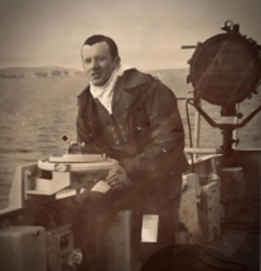
Pictured Left; Paul McKay – Falkland Islands 1982
Then a Lieutenant of the British Royal Navy and sensibly sorry for the human losses caused by the conflict, Paul had participated in an alternative offensive plan against the Argentine ship, ARA Bahía Buen Suceso which would be carried out with helicopters. Days after that interview, he asked me if I could help him with something that had haunted him for long, dark years. Like a storm that never dissipated in the post war traumatic sky. Ghosts that left him on the brink of death in the nineties through depression and suicide. His message was: “I would like to be able to have some certainty as to whether I killed or injured someone during an attack that I carried out with helicopters in the early morning of 15 May 1982, in Fox Bay, seeking to put the resupply ship ARA Bahía Buen Suceso out of service.” Paul continued, “I unloaded two machine gun magazines against Argentine positions, from which intense anti-aircraft fire was fired at us. We escaped from death by a miracle. Here, in Great Britain, there is practically no information regarding that action ”.
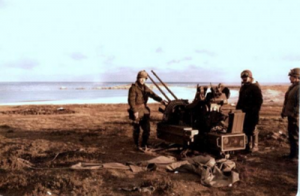
Pictured Left; Argentine Andi Aircraft Position, Fox Bay 1982
The mission to help him was a privilege from a human point of view. Without even thinking about how I would expose him to the truth if there had been deaths in that combat, and having great faith that I could tell him there hadn’t been any, I began to investigate. I knew that the ‘General O’Higgins’ Infantry Regiment 8 (RI8) had been stationed in Bahía Fox [Fox Bay ], a unit of the Argentine Army that took a thousand men to the Malvinas, the vast majority of them young people from Cordoba, who at that time were complying with compulsory military service. I knew several war veterans from RI8, among them, Jorge Alberto Racca, author of the book ‘Diario de Malvinas, 77 days between fear and courage’ , a valuable work in which he reflected his experiences as an 18 year-old soldier during the war and that he had graciously given me. I looked for his testimony of 15 May 1982. In a fragment, he said: “While I was sleeping the lightest in our group, I felt something was to happen that night, and between 4am to 5am there was sporadic fire in the distance that came to wake us all, …then an air raid alert. So, we quickly got up and hurried to our defence stations. While we were charging out, we felt and heard a tremendous noise. It was a helicopter that was hovering about 70 meters from the house, so I ran out. Our men were already shooting at the helicopter from all around our station. I didn’t see the helicopter. I was confused if the noise was actually one of ours or the Englishmen. But according to those who saw it, it was one similar to that of the English. A soldier was badly hit by bullets in the muscle of his legs, but luckily it didn’t touch a bone. Just the muscles. And they were able to remove the projectiles from his body ”. I called Racca. I asked him if he remembered who that wounded soldier had been. Right away, he wanted to collaborate. He would ask in his veterans WhatsApp Group. At the same time, I consulted another war veteran – from Commando Company 601- who assured me that that day there had been no deaths, neither among the RI8 troops nor among those of the Company of the 9th Engineer Battalion, which also had been defending at Fox Bay, it reminded me. While Racca continued to find out, I consulted Sergio Gigena, also a Cordovan fighter from RI8.
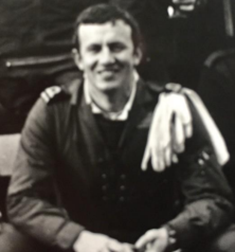
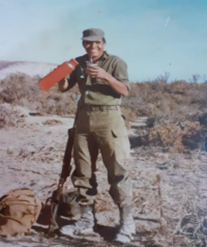 Cesar R Moreno & Paul McKay – Enemies 1982
Cesar R Moreno & Paul McKay – Enemies 1982
“I remember that action well. I had to live through it on the front line. There were no deaths to mourn. But the wounded soldier was Moreno, César,” he told me. Racca, meanwhile, had already found Moreno himself, who was awaiting my call. Before talking to César, I wanted to write to Paul. Illusively, as if a few hours or a day could counteract the phantasmagorical action of 38 years ago in which the Englishman was looking for inner peace and to embrace his Cordovan enemy of that time. I transmitted the information to him, which he celebrated from his heart and he asked me if it was possible to find César, and for him to communicate with him. In addition to committing the message, I was conscious about how healthy it might be for the peace of mind of my new English friend. I asked Paul to describe what that mission had been like to him. To try to understand what he and César had both been through. To tell the story as it happened. “It was pretty crazy,” McKay recalls. “But in war, wild attacks often produce successful results,” added the retired English military veteran, who was 28 years old during the Falkland war, including eight years of service in his country’s Navy. “A couple of Lynx helicopters were supposed to fly at night and reach Fox Bay, where British intelligence had informed us that a transport and resupply ship (possibly the Bahía Buen Suceso) would be unloading war material, ammunition and supplies to the troops stationed there.”
“The objective of the mission was, after confirming by visual identification, whether it was indeed the Bahía Buen Suceso and not the hospital ship Bahía.
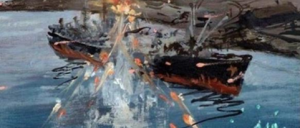
Pictured Left; The Target
Paraíso, was to neutralise upper deck sentries and to drop a large ‘homemade barrel bomb’ down the funnel that would explode the war material that the ship had on board and put it out of service.” And Paul continues: “The use of missiles, both from the helicopters and from the frigate (the base of the two Lynx aircraft that were used in the attack was HMS Brilliant), was ruled out, due to the possible damage that they could cause in the hamlet and the civilian population of Bahía Fox [ Fox Bay ], in case their impacts were not precise ”. Flying very low at 50ft, completely in the dark, navigating the high ground with the assistance of a map and his previous knowledge of the Islands, the British helicopters entered the San Carlos Strait (Falkland Sound) between the Gran Malvina Islands where Bahía Fox [Fox Bay] is located and headed to the place of the target objective. Because it was 4am, they thought they would take the Argentine troops by surprise, with the majority sleeping. However, 60 seconds before reaching the target ship they were still to positively identify, they were greeted by a waiting fire trap from RI8 and Engineer Company 9, which quickly became extremely intense.
“Flying through the heavy shooting, we barely managed to get to the side of the stern of the ship and hover to illuminate with our landing lamp that bore the name of the ship, which was written in white letters on a black background,” McKay says. “I yelled over the intercom ‘Buen Suceso!’ Buen Suceso! Target confirmed! But immediately, we began to receive from my left side more intense anti-aircraft fire of medium to heavy caliber ammunition. It was well directed above, below and directly at us. I started to think that we really wouldn’t get out of there alive. I took my Sterling Sub Machine gun and unloaded two complete cartridges out of my cockpit window towards some black figures on the ground that were moving towards us and from where the heavy fire was coming from”.
One of those figures, and one who was shooting at Paul’s helicopter, with an Oerlikon 20mm caliber monotube automatic anti-aircraft gun was Moreno César. “From the small hill I was on, I could clearly see them (the enemy helicopter) on top and next to the ship, swaying violently to avoid the bullets, as we engaged them,” recalls César, who was 18 years old at the time. “In one of the evasive maneuvers, the helicopter approached overhead my position, seeking to escape by the heights that were behind me. That’s when I felt a hot blast in my body.
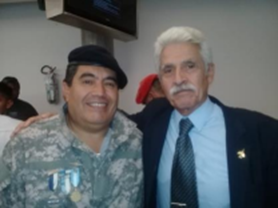
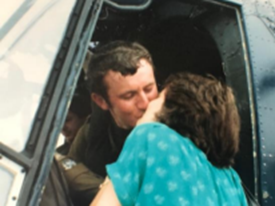 Pictured Left; After the War – Relief we are both alive
Pictured Left; After the War – Relief we are both alive
Apparently, a bullet hit the Oerlikon barrel and it went into my left leg”, he recalls. “It threw me off the cannon seat. I fell to the floor, with a strong burning in my thigh, as if hot irons were piercing me. At the same instant, another gust of bullets hit within a meter and shook the sand all around me. Rolling over on the ground, I tried to escape the bullets. I could barely see the helicopter go away. ”
“Really, I thought I was dying,” confesses the Cordovan fighter. I thought of my mother. In how she would suffer if I did not return. For her, I didn’t want to die that morning. And thanks to God and the Virgin Mary, I just survived”, says César. “Over the years and coping with how difficult it is to have been in a war, resigning some of the most cherished dreams of my youth such as wanting to become a great professional athlete, that was taken from me with disability by the Englishman, I appreciated that I live to remember those who fell on the islands. And I am grateful that he (the Englishman) was able to start a family also. ”
Neither César nor Paul returned to the Falklands Islands, something they would like to do at some point. For now, they spontaneously shared the vigil of the anniversary of the attack, May 15. From the UK, McKay wrote to him: “César, your family must surely be very proud of you. You are a hero. I am happy to be in touch with you and know that you are well. I hope this is the beginning of a long friendship among us…”.
Almost at the same time that the exchange of fire that sought to be fatal that morning took place, César replied to McKay from Córdoba: “Paul, believe me that I feel happy about my injury. Being hurt and then surviving allowed me to meet you. Thank you for the friendship and photographs in which you are with your children, who according to what you tell me is practically the age we were in the war. I hug you with my soul ”
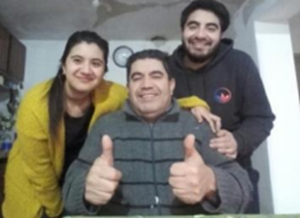
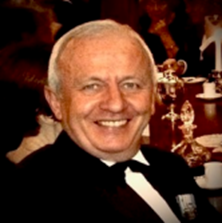
Pictured Left; Cesar & his family in 2020 & Paul McKay in 2020 – THE VERY BEST OF FRIENDS
It still makes me think how the hell did we survive that night in Fox Bay to tell the next part of the story.
The next article will recount the actual British planning of the attack and its execution. Not a James Bond movie plot but it sure as hell had all the fireworks and shaken but not stirred moments that Bond would have admired.
